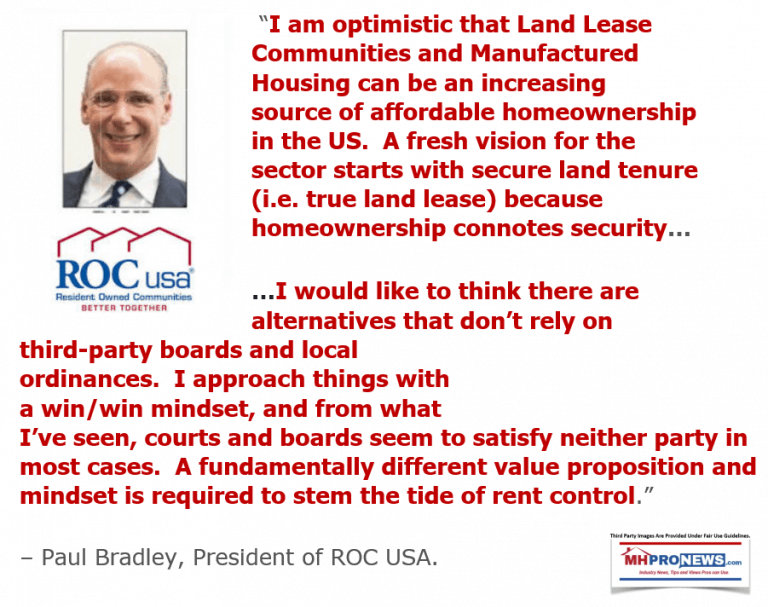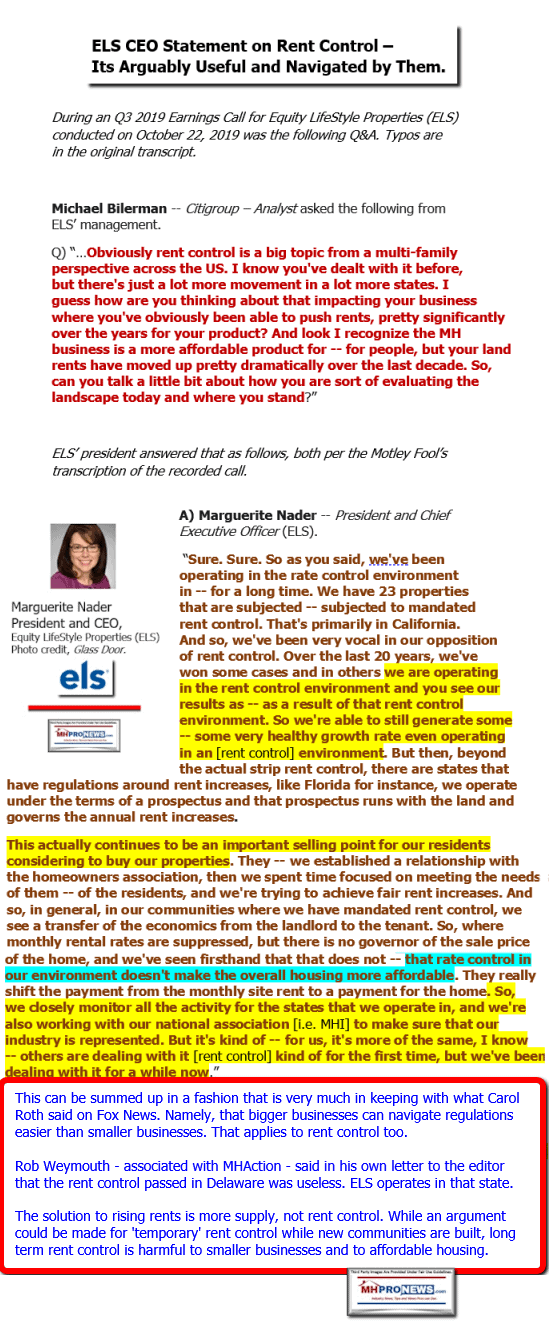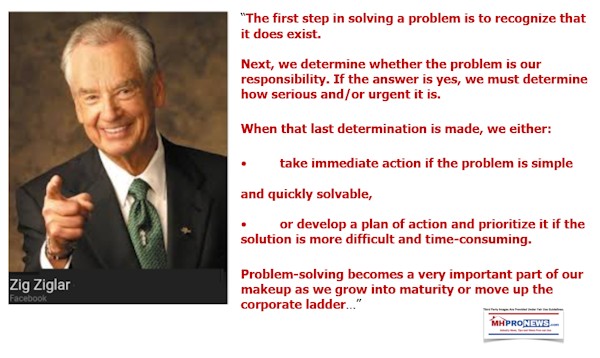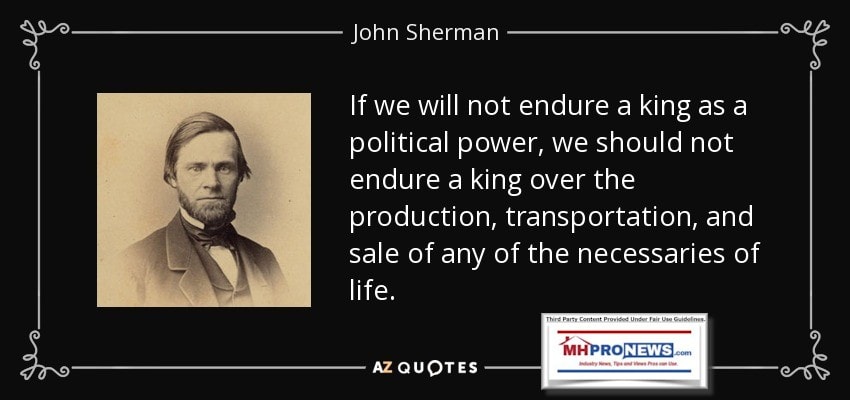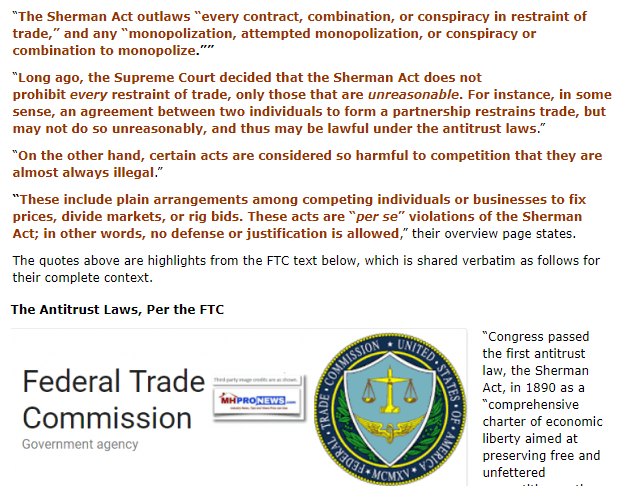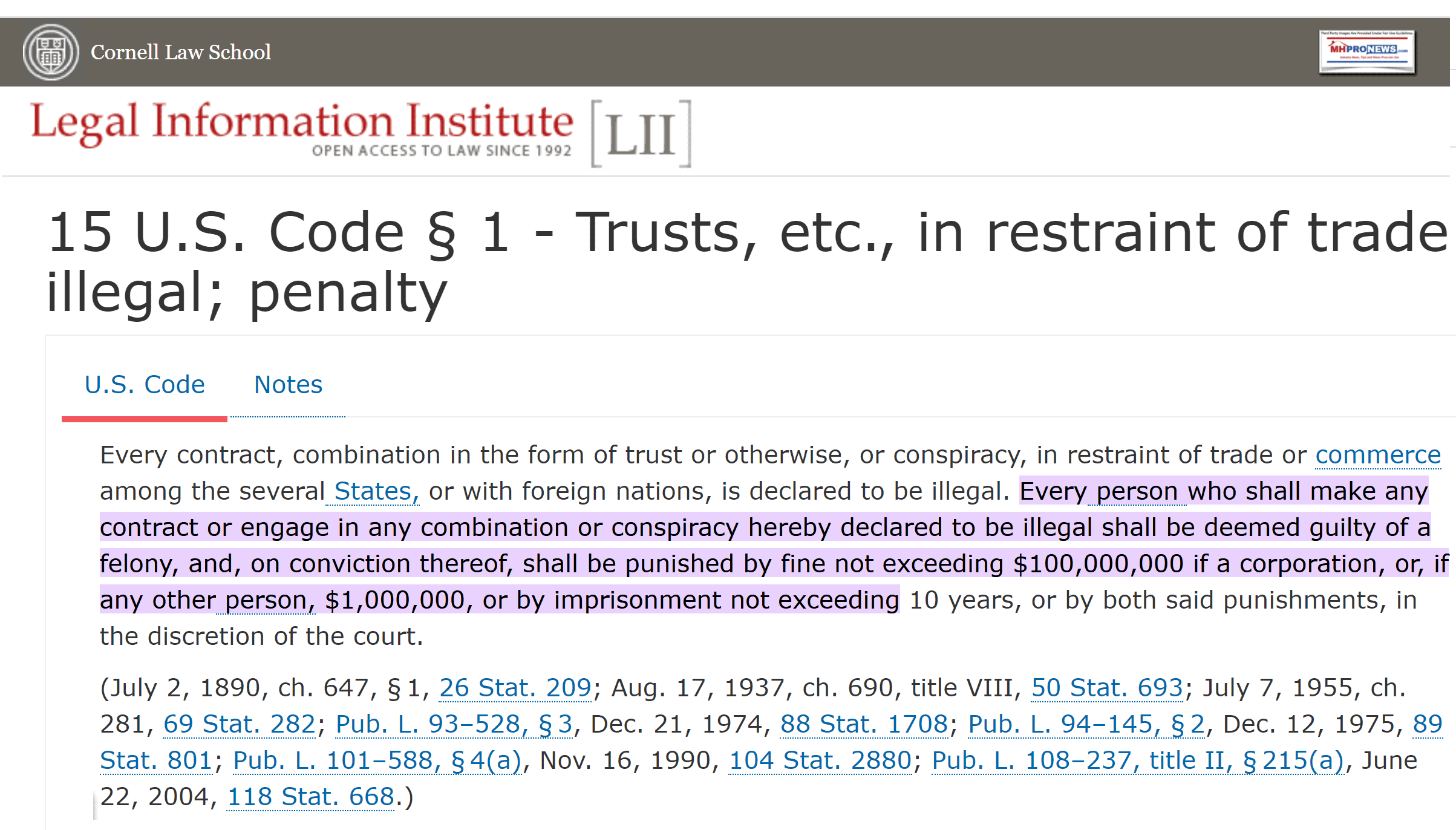Preface. As a disclosure, this writer has spent about half of my adult life living in manufactured homes. From Texas to Wisconsin, Illinois to Oklahoma, I’ve owned and lived in several HUD Code manufactured homes I was happy to have my friends and colleagues come to visit. I’ve also spent numbers of nights in later model mobile homes (late 1960s to early 1970s) as a guest. I’ve lived in several manufactured home communities (MHC), having worked in them in a management capacity. But I’ve also been ‘just another resident’ of this or that MHC. So, I’ve been on both sides of the proverbial fence in several ways. I’ve known happy residents who had a good relationship with management. I’ve also experienced and witnessed upset residents and tension with management. Not only is that accurate, but beyond the merited disclosure, it also means that this fact, evidence, and viewpoint (expert opinion) column is not merely editorial or academic musings.
The following is a distillation of decades of experiences that are meant as an introduction to under-appreciated possibilities for residents to organize or reorganize in a manner that would allow them to ‘fight back’ and win when faced with unjust, problematic and/or predatory management practices.
I.
I think my hair began turning gray one evening in north-central Wisconsin when I was in the modest office of a manufactured home community. It was the office of one of several land lease communities I was invited to supervise for a multiple state community operation. Though I was the new kid on the block for that firm, and had nothing to do with the list of items that created the irritation – and anger for many – among that roughly 100 homesite location, to those residents I was meeting with for the first time, I represented management. It was the perfect opportunity for them to express years of frustration.
For the first few minutes of that meeting it was pandemonium at that meeting. One resident had a video camera and was recording the uproar which was occurring. I had a colleague with me who happened to be an ex-Vietnam veteran. Normally mild mannered, that fellow finally got tired of the upheaval and shouted the attendees down. While I don’t recall word for word what he said, it was something to the effect that I offered to meet with them and they should be fair enough to hear what I had to say.
Once a level of quiet settled in, I was able to share what was on my mind.
6 months later, that same property went from dozens of angry and frustrated residents to only a handful that felt the same way. I was there and to the other properties to make things right. Once the residents saw that and experienced it firsthand, most went from opponents to allies. I should mention that even though I was an area supervisor (with 7 manufactured home communities in my care) I had to get permission from the corporate home office just to have that meeting with residents.
I won’t go into details (company name, a more precise location) or the full laundry list of complaints. But in several ways, it would be familiar to all too many who live with problematic management. But in fairness, there are problematic managers and problematic owners/management. Sometimes, it’s both. But among the first points to be made as a lesson learned is that sometimes corporate officials have little understanding of what an employee(s) or contractor(s) might be doing that fails or upsets both residents and management.
For those who have lived in a manufactured home community that had tension with management, the experiences are relatively common.
- A) Maintenance (as in failure to maintain) issues. This may be streets, sewers, water system, trees, and anything that is owned by the community operator that could limit or impair its proper use by residents.
- B) Aggressive increases in site fees. Let me note that in the properties I managed, by today’s standards, each of those increased fees were modest, usually about $10 a month from the year prior and with fairly low site fees to begin with).
- C) The list could go on to claims of favoritism, bias, heavy-handed eviction threats and bully tactics, crime, drugs, etc.
- D) My meeting with residents I’ve described occurred pre-2008. Nor will I comment on what occurred after I left that company’s employ. What I will say is that at least in my region of that state and during my tenure, I was given a reasonable latitude to get positive changes accomplished. From both management and resident vantagepoints, each obtained meaningful and measurable achievements.
- E) For example. I identified and rooted out examples of what the evidence suggested was possible corruption and illegalities. Upper management worked with me to establish a budget (CapX) and plan to make improvements in roads, curb appeal, and infrastructure. I initiated a newsletter that allowed me to explain to residents the realities of operating a community, so they didn’t think they were getting ‘ripped off’ just because there was an increase in site fees. I worked with residents, law enforcement, and public officials, as well as with corporate management.
- F) Within a few months, it is fair to say that all seven of those properties, the bulk of the residents and our regional management came into alignment. We worked with each other. We spoke with each other. I lived side-by-side with the residents in one of those 7 communities. My wife and I would walk the community, and people could stroll up and speak up if they wanted to do so. It was neighborly, friendly, and safe.
- G) As another for instance. After implementing neighborhood watch and other programs, a local police official told me that crime in the location I was in was lower in our community than in the conventional housing neighborhood across the street. That conventional housing neighborhood featured nearly new single-level housing that sold for many times the cost of even the newest manufactured homes being sold in our neighborhood. That property went from being something that attracted negative media to one which received positive municipal and media reports, all in less than a year.
- H) Occupancy in those days was an issue. Manufactured home sales rose at our locations. Our occupancy rose. Following those engagement with resident efforts, within weeks, residents were recommending to their friends that they come check out living at their community. Resident referrals were rare before I came, but in short order, they became the #1 or #2 source for new residents every month. That’s measurable progress. Our newsletters to residents frankly explained how higher or full occupancy was in their interests as well as that of the owners.
- I) That included improving the resale value of each resident’s home. This is an area (protecting resale value) that too few resident groups mention, unless it is as a complaint that predatory management is undermining their resale values. There is a flip side to that issue.
II.
The next point that might be made from those and other experiences is this. There are broadly speaking two different types of management in manufactured home land-lease communities in the 21st century.
- A) There is management that wants a positive, win-win relationship with their residents. Such management is not predatory. The traditional view of business has been to serve customers well and to make a reasonable profit. That was the paradigm for thousands of individually owned manufactured home communities for years. It remains so for numbers, but there is also the second category of management (see II B) below).
- B) Then, there are manufactured home land-lease properties where the management – by accident and/or design – is arguably predatory. Such properties generate the bulk of the negative news reports that make mainstream news or are among the darker topics explored on MHLivingNews and/or MHProNews.
III.
Over the years, I’ve seen first-hand land lease operations from coast-to-coast and border-to-border. Some 10 to 20 years ago, if asked, I might have casually denied that there are predatory manufactured home community (MHC) operators, because they were not nearly as common or obvious as they are today. The evidence that they exist and have grown in number persuaded me that some community operations are led by people who may posture one thing while they darn well known they are doing something entirely different. For a time, I bought the propaganda that slick talkers peddled when I would ask about some news article or other piece of evidence. In my own defense, their arguments were clever and convincing enough for someone not on the scene and who only has a few minutes to consider an allegation.
Thankfully, for some years now and distinct from my previous impressions, when I hear about steep site fee hikes, bully tactics, quick-to-evict threats, aggressive ‘fines’ by certain management companies for relatively modest rules infraction and so on – when the evidence is there – there is no reason to deny its troubling reality. Do such practices describe everyone in the manufactured home community sector? No. But is it sadly common enough where it needs attention? Yes. That is why this guide is being written after years of doing reports on the problems found in locations from coast-to-coast.
With that in mind, the following insight is useful for reasons that will be explained later herein.
- A) Another key point that ought to be made is this. While there may not be a 100 percent correlation between aggressive and/or predatory community operators and membership in the Manufactured Housing Institute (MHI) and/or one of MHI’s state association affiliates, it occurs often enough where that common thread merits attention by residents, their advocates, media, and public officials.
- B) Let’s rephrase that for clarity and emphasis. Membership in MHI and/or an MHI state association affiliate is often found to be a common link in accounts of predatory behavior by certain brands. There is a void in mainstream media accounts on this troubling but demonstrable point.
- C) For evidence based examples of that allegation, please see the report linked here. Notice that every one of the firms named in that litany of predatory brands has MHI ties? Nor has MHI denied that, after repeated inquiries, which they normally give a de facto ‘no comment.’
- D) When MHI’s outside attorneys have been asked about that apparent common link between predatory behavior and MHI membership, their attorneys similarly may offer a de facto ‘no comment’ reply to those concerns. Keep in mind that charges of predatory behavior that could be linked back to MHI and/or MHI state association membership arguably opens the door to legal steps that has largely been overlooked by most resident-activist groups.
- E) Why does this matter? Because if public officials begin connecting the dots between predatory behavior and membership in MHI and/or an MHI state affiliate, other legal opportunities for residents to push back become available.
- F) Once residents make this a common talking point with media, public officials, and/or plaintiffs’ attorneys, an array of legal options become available. Instead of being on the defense, residents could be going on the offense against predatory brands. More on that further below.
That noted, it is sad, but there is an apparent ‘war’ against manufactured home community residents that has been declared by consolidators working on behalf of private investors or public traded corporate capital. MHLivingNews have been reporting on this for some years, which includes the report linked here.
Those firms often get low cost financing for the purchase or refinance of one or more land-lease communities through lenders using Fannie Mae or Freddie Mac. The Duty to Serve (DTS) manufactured housing program has tragically been turned on its head. See the report linked here for insights and evidence. A resident-leaders statement to the FHFA is linked here.
There is a more subtle combat being waged by those consolidators against the white hat manufactured home community owners. Evidence is useful, and the following slides from publicly traded Flagship Communities is a useful example. Flagship, as MHLivingNews reported, was previously known as SSK Communities. SSK had an “F” rating at once point with the Better Business Bureau (BBB).
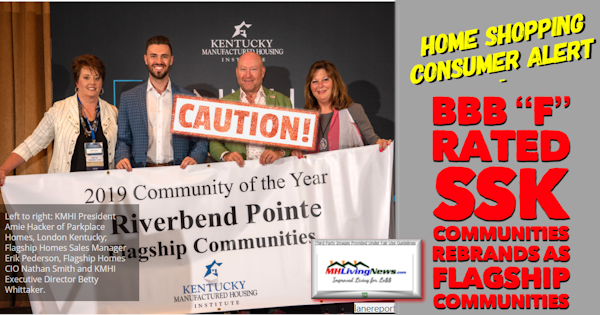
SSK Communities rebranded as Flagship. Flagship have been given ‘awards’ by MHI and at least one MHI state affiliate. Yet, as another notorious MHI member noted, SSK Communities – which has Nathan Smith, a former MHI chairman as a co-founder – was being sued at one point by their own residents.
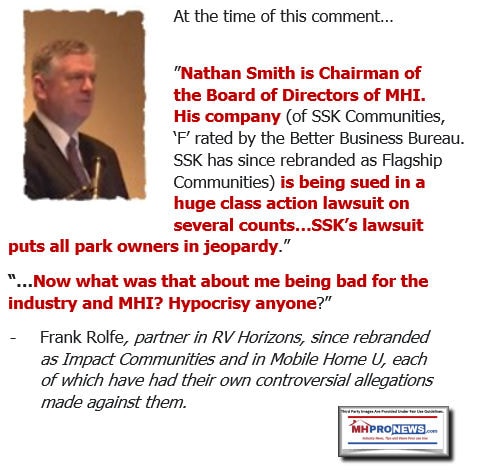
Now, stop and consider this picture. A now former MHI chairman – Nathan Smith – is the co-founder of a brand that has been sued by his own residents. Ponder that in connection with the bullets in section III, above.
But it isn’t just one former MHI chairman has been found with apparent dirt under his well manicured fingernails. Consider that the Securities and Exchange Commission (SEC) has sued prominent MHI member Cavco Industries (CVCO) and their former chairman and CEO, Joseph “Joe” Stegmayer.
Stegmayer stepped down from formerly leading Cavco, but stayed on as chairman of MHI. What? Seemingly odd, but true.
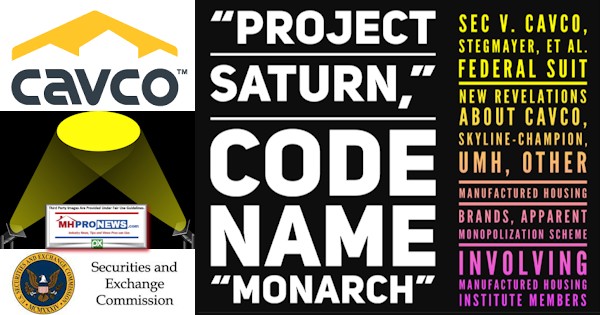
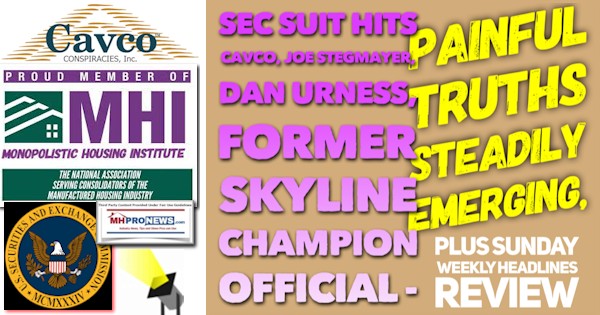
This writer is not an attorney. But we have discussed several of these issues with attorneys. IMHO, these pull quotes and facts are potentially useful because:
- G) They are accurate.
- H) One MHI member is pointing their finger at another MHI member (i.e.: Frank Rolfe at Nathan Smith).
- I) The member making that statement (Rolfe) has arguably done some of the same things that Nathan Smith has done, perhaps worse.
- J) No less important, it begins to bring into focus the troubling concern that MHI is not a typical trade association. What MHI was, perhaps 20 or so years ago could well be different than what it has steadily evolved into since the start of what will be called herein the Berkshire Hathaway era of manufactured housing.
IV. Facts vs Hyperbole – Understanding as the First Step in Problem Solving
The late Zig Ziglar, a positive thinker and ‘can do’ minded ‘success’ story said the first step to problem solving is to understand the facts about an issue.
In terms of understanding the problem that exists for tens of thousands of residents in manufactured home communities that are owned-operated by ‘predatory’ brands, there are a range of potential resources. Mainstream media has reported on numerous examples of aggressive tactics that may include eviction threats/action for seemingly modest ‘offenses’ or relatively modest sums of money.





There are several manufactured home resident organizations. According to residents’ comments to MHLivingNews, some of those are better than others. Our purpose in this report today is not to sift the wheat from the chaff among the various resident groups, save in one example. That is the allegations made by then Golden State Manufactured-home Owners League (GSMOL) President Michelle Smith against MHAction.
MHAction, Smith informed her readers/members and MHLivingNews, is funded at least in part by the Tides nonprofit. After double checking Smith’s claim, she proved to be correct. Let’s get in the weeds for a few moments because the details matter.
After MHLivingNews did the report linked above, MHAction eventually disclosed that tie between themselves to the Tides Center on the base of their home page.
The Tides, per ‘follow the facts,’ ‘follow the money’ focused Influence Watch, has long had Warren Buffett and George Soros as among their two top donors. First, some evidence.
Ponder that for a moment.
- A) Buffett is the corporate chairman for Berkshire Hathaway (BRK). Berkshire has several brands involved in the Manufactured Housing Institute (MHI). What emerges is the picture that funding both some of MHI’s so-called predatory brands are being funded by Buffett-Berkshire bucks, directory and/or through ‘dark money’ channels.
- B) Then in the case of MHAction, the ‘push back’ against predatory brands ‘for’ residents are also getting Buffett backing?
What is going on with that seemingly odd fact-pattern?
- C) Next, in fairness to MHAction, they have – sometimes in connection with other nonprofits – done some useful factual research on the problems that have occurred in the manufactured home community sector as a result of private equity backed companies which often aggressively go into acquisition mode targeting purchases of properties previously independently owned. Residents can go from benign to warm relations with management to waking up one day with entirely new owners which have an entirely different management approach.
So, there is a useful component to MHAction and/or their related nonprofit research and reports on this evolving pattern.
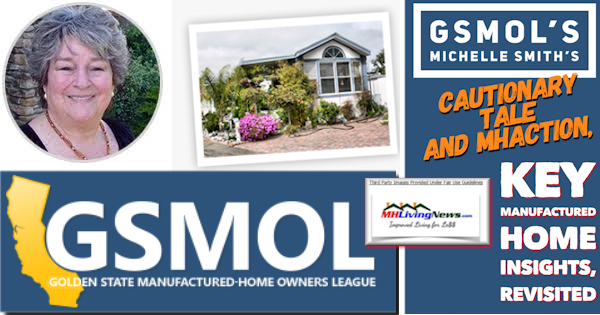
V.
But there are also weakness to MHAction and their periodically associated nonprofits. Some of those, in no particular order of importance, are as follows.
- a) MHAction proposed ‘solutions’ may not all actually work in practice. More on this and the following further below.
- b) MHAction reports stir up news coverage that is often a mixed bag. This matters because there is a need for nuanced reporting that holds specific predatory brands and specific behavior to account.
- c) Specifically, reports should be framed in a way that doesn’t undermine the value of manufactured home living, and thus the very equity of homeowners who may live in a community with a predatory owner.
- d) A fine example of how separating the wheat from the chaff can occur is exemplified by the late Robert “Bob” Van Cleef. Van Cleef routinely praised manufactured homes and manufactured home living. He would then frame his comments carefully by pointing out possible solutions that didn’t undermine the lifestyle.
Manufactured Home Community Leader Discusses – Manufactured Housing Insanity?
Manufactured Home Resident Leader Asks For Federal Investigations
- e) As a disclosure, a few years ago, Van Cleef contacted our trade publication. He said that after doing considerable reading on our site, he came to the conclusion that we were correct on a range of subjects related to manufactured home living. There was a pair of areas that Van Cleef and this author saw quite differently, but they were political/religious, and not directly connected to manufactured homes or manufactured home community living. That noted, Van Cleef offered to be ‘tutored’ on some of the nuances involved in often murky aspects of manufactured housing. Van Cleef plugged into a range of resident groups, including MHAction.
- f) That said, Van Cleef and our platform shared a staunch belief in the rights of manufactured home community residents. We both believed that predatory brands should lawfully be held to account. Further, Van Cleef and this writer shared the belief that existing laws could be put to work that would mitigate the problem for existing and future manufactured home community residents.
- g) Rephrased, existing laws – IF THEY ARE ROBUSTLY ENFORCED – might rapidly and properly put a check on the predatory behavior. That is what the next segment of this report will focus on, after a quick lesson in economics 101.
VI. TANSTAAFL – There Ain’t No Such Thing As A Free Lunch
The lesson of TANSTAAFL is simple. No product or service is free. Someone always pays. Politicians often use the phrase ‘free,’ for instance, ‘you’ll get the COVID19 vaccination for free. Pardon me, without any comments on this treatment commonly called a vaccine, it is hardly free. Taxpayers are paying for it. Who are taxpayers? Directly and/or indirectly, it is the taxpaying citizenry. Even those who don’t seem to pay taxes are often indirectly supporting the cost for a ‘free’ whatever. Among the only things that are ‘free’ is the air we breathe. If some corporation and/or government official figures out how to charge for breathing the air, that could change someday.
The fact that nothing in the way of a product or service is free matters.
Supply and demand are an important component in how predatory brands shrewdly calculate how they can ‘get away with’ what would normally not be a workable business strategy.
- A) Traditional U.S. businesses, especially smaller ones that care about what their customers think and may say to others, want to make a reasonable profit while having happy customers.
- B) But when competition is artificially limited, it is possible to behave in an aggressive fashion and still not lose many residents. While residents living in a predatory-minded community operator may lose, those brands employing predatory business model can rapidly and profitably replace any given ‘lost’ resident.
- C) Restated, because of VI B), the traditional ‘American way’ business model – in or beyond manufactured housing and manufactured home communities – is upended. What has replaced it is a something akin to a localized monopoly. The painful lessons of decades of off and on battles against actual or potential monopolists in America are being lived out in the manufactured home community sector.
- D) Who says? Several sources, but perhaps ironically the one that makes a potentially useful case for manufactured home residents is one of their arguably arch enemies. Namely, Frank Rolfe.
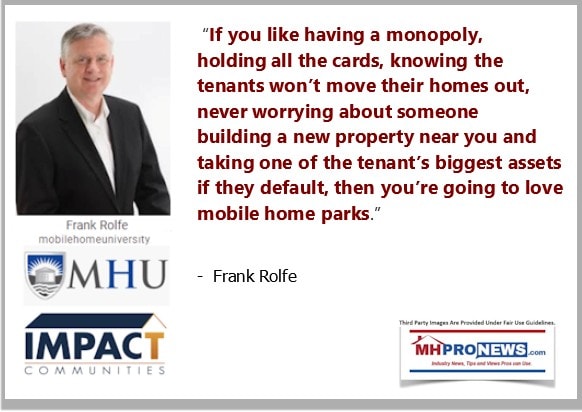

- E) What Rolfe and others have pointed to as why they can ‘get away with’ their predatory tactics is because there is often little or no effective competition in a given market. Often with few or none of the apparent safeguards that say a local utility (which may also be a monopoly) has to function in, residents in manufactured home communities are facing a variety of possible tactics that aim to pick their pockets.
- F) Unlike an apartment complex, or for a typical RV owner, a manufactured homeowner has far higher costs to relocate. Additionally, even if a manufactured homeowner could afford the costs to move to another community, if there are no vacancies in that area, they are effectively ‘stuck.’ Or, some communities may have a vacancy, but they may not want to accept a 1967 model mobile home in their community next door to a 2022 brand new model manufactured home. Thus, Rolfe’s claim has a troubling point.
Van Cleef and this author came to a sort of meeting of the minds. In principle, rent controls do not work, at least, not in the fashion that its supporters claim. Van Cleef suggested that something had to be done as a stop-gap until market forces could be brought back into the manufactured home community business. We agreed that perhaps something like a kind of temporary safeguards against high price hikes could be put into place, somewhat akin to what happens in Florida after a hurricane hits. Price gouging is prohibited. That prohibition against price gouging technically violates the free market. But it is done so that the majority of harmed citizens aren’t harmed twice: first by nature, and then by predators who want to take advantage of a problematic scenario in order to make a higher profit.
Paul Bradley, with ROC USA, and his statement on rent control has long been a centerpiece for our thinking on this subject. Bradley is unlikely to be accused any time soon of being in the pocket of predatory brands. He is one of the more celebrated resident-advocates, with good reason. So, if Bradley – after examining the evidence – questions the long-term wisdom of rent control, then it is a viewpoint worth pondering.
To illustrate that some of the largest, and arguably among the MHI firms that are accused of predatory behavior, firms are not as afraid of rent control as they sometimes posture, consider what Equity LifeStyle Properties (ELS) President Margerite Nader told investors during a ELS earnings call.
So, once more for emphasis. The point here is that rent control alone will never solve the underlying issue. Which is supply, demand, and the currently unequal situation that exists in far too many manufactured home communities, or older mobile home parks built before the HUD Code for manufactured housing went into effect on June 15, 1976.

VII. A Better and Winning Strategy for Residents?
For clarity, let’s note that there are already significant things that numbers of authentic manufactured home community residents have done. That said, it is obvious that in numbers of states, residents are on the defensive in the face of predatory brands, which this report has pointed out are often MHI members and/or are members of an MHI state association affiliate.
So, what this report will argue is this. Manufactured home community residents, individually or collectively, could organize/reorganize and employ the following plan to tip the scales back in their favor.
Where a resident group already exists, these concepts could be digested and put to work in a rapid fashion.
Where a resident group doesn’t yet exist, one could be formed and deployed with these concepts in mind.
In no particular order of importance.
- A) There is a need to understand how the good EXISTING laws could – if routinely and robustly enforced – result in a more rapid rebalancing of the power battle between predatory brands and their residents. See some of the reasoning by volunteer resident-advocate Van Cleef, linked here and above.
- B) As was noted above, residents benefit when they understand the economics behind a manufactured home community. Part of what ROC USA does in transitioning and establishing a new resident owned community (ROC), is to teach them the realities of operating a property in the real world.
- C) One of the useful phrases MHAction uses is this: “the many can defeat the money.” With the right understanding, motivation, and action, that statement is 100 percent true. How that could best be done will be explored further below.
- D) What is the potential for the many living in a home located in a ‘predatory’ manufactured home community operator property? What is necessary to tap their individual or collective potential? What are the market and legal tools that could be used to turn victims of predatory brands into victors in the battle for manufactured homeowner rights?
Let’s examine some facts useful to understand in each of those in VII D).
- E). There are hundreds of thousands of homesites in the various portfolios owned by brands that are sometimes to routinely accused of predatory behavior by their own residents.
- F). That’s potentially lots of votes. Meaning, politically, there are often enough voters in some local race, Congressional district, or state where manufactured home community residents could tip the scales in a close race between competing major party candidates.
- H). While MHAction tends to lean strongly left (Democratic), it is tactically a mistake to automatically cast the lot of manufactured home community residents into just one political party. Far better for resident groups to be nonpartisan. Let them negotiate with competing candidates for specific positions that they should take in order to earn a group’s votes.
- I). Because supply and demand is an issue, residents should organize at the state level with the following legal points in mind.
- i). The argument can be made that several manufactured home communities are violating antitrust/market manipulation laws. For the first exhibit, look no further than Frank Rolfe’s brazen statement cited above about having a “monopoly.” The Sherman Antitrust Act established criminal as well as civil penalties for violations. The Clayton Act is supposed to be used to bar certain types of consolidation. These laws need to be understood by manufactured home residents and consumers. See more on this linked further below.
- ii). The Manufactured Housing Improvement Act of 2000 (MHIA) established “enhanced preemption” for HUD Code manufactured homes. This is very little discussed in mainstream media, and when it is, it is often an incomplete discussion. In brief, “enhanced preemption” should enable HUD to overcome local zoning and placement barriers that discriminate against manufactured homes. See the quotes further below. Why does this matter? Because if “enhanced preemption” were better understood and became commonly applied, some of the ‘monopolistic grip’ over manufactured home residents could be weakened if not broken.
- iii). The Duty to Serve Manufactured Housing was made law as part of the Housing and Economic Recovery Act (HERA) of 2008. MHI community members are often using this as a lever to refinance and/or purchase a manufactured home community. Once a property is financed/refinanced, the community owners often dramatically hike the site fees. This is almost the polar opposite effect of what DTS was supposed to accomplish. Instead of DTS making homeownership more available and affordable, it is being twisted in a manner it was never intended to be used. It will take organized push-back to change this dynamic.
- iv). The federal government, and sometimes state governments, have programs that are supposed to make development of affordable housing in general (or manufactured homes specifically) easier. A combination of putting those little-known development laws to work with the MHIA’s “enhanced preemption” provision could make creation of new communities that could be (or become) resident owned communities (ROCs). Put several stars next to this one for a useful, and potentially profitable, strategy for residents.
- v). Residents and/or legal representatives of residents could engage in a process of reaching out to ‘white hat’ billionaires and/or socially conscious charities that have deep pockets. A process could be established that would use existing laws (see the above under VII I) and these sub-bullets) to develop properties for beleaguered residents in given markets. Once a phase of a development is completed, additional phases could be opened to pull residents away from brands that are currently stalking their own residents. That would in time push predators to reconsider their problematic ways. Once such a development is completed, it could be sold to the residents and an ROC or similar legal entity is established. Rephrased, create ‘white hat’ economic alternatives – competitors – to the black hat and predatory brands that are tarnishing and undermining manufactured home community living. A win-win can be established.
- vi). Racketeer Influenced and Corrupt Organizations (RICO). RICO has been used against those who aren’t the Mafia (organized crime type organizations), but who are ‘corrupt’ organizations that have arguably engaged in criminal behavior. RICO has both civil and criminal penalties. Think about RICO with respect to MHI and/or MHI state affiliates that are failing to enforce their own code of ethical conduct.
- vii). Hobbs Act and state equivalents. Extortion by fear is a crime. A common complaint heard from manufactured home residents in communities operated by predatory brands is that they use intimidation (fear) tactics. This type of purported behavior can take several different shapes. But with the Hobbs Act and fear tactics designed to ‘extort’ from residents, exploring how this law could be used is a worthwhile exercise.
- J). Consider what Wikipedia says about the Hobbs Act: The Hobbs Act,named after United States Representative Sam Hobbs (D–AL) and codified at 18 S.C. § 1951, is a US federal law enacted in 1946 that provides:
(a) Whoever in any way or degree obstructs, delays, or affects commerce or the movement of any article or commodity in commerce, by robbery or extortion or attempts or conspires to do so, commits, or threatens physical violence to any person or property in furtherance of a plan or purpose to do anything in violation of this section shall be fined under this title or imprisoned not more than twenty years, or both.
Section 1951 also proscribes conspiracy to commit robbery or extortion without reference to the conspiracy statute at 18 U.S.C. § 371. Although the Hobbs Act was enacted as a statute to combat racketeering in labor-management disputes, the statute is frequently used in connection with cases involving public corruption, commercial disputes, and corruption directed at members of labor unions.
The Hobbs Act criminalizes both robbery and extortion:
- “robbery” means the unlawful taking or obtaining of personal property from the person or in the presence of another, against his will, and
- “extortion” means the obtaining of property from another, with his consent, induced by wrongful use of actual or threatened force, violence, or fear, or under color of official right.
- K) Summing up, there are an array of possible economic and legal paths that could be deployed that are based upon existing laws. Some of these have the advantage of being criminal laws. Those criminal laws, once a federal, state, or local prosecuting attorney agrees to act could lead to prosecution and potential prison time for those who are preying on the manufactured home community residents.
- L). Imagine, for a few moments, what the ripple effects among predatory brands would be if one- to several-community operators went to prison for some form of predatory behavior and/or market manipulation. So long as the evidence-based claims of predatory behavior by the Frank Rolfes’ of MHVille – notably those who are MHI and/or MHI state affiliate members – are thinking they have little or no risk, predatory behavior is likely to continue. But once predatory behavior and/or market manipulation results in heavy fines and/or imprisonment, that temptation by the predatory may diminish.
- M). Class Action Lawsuits. This has already been done successfully, but should/should be accelerated. See the reports linked below.
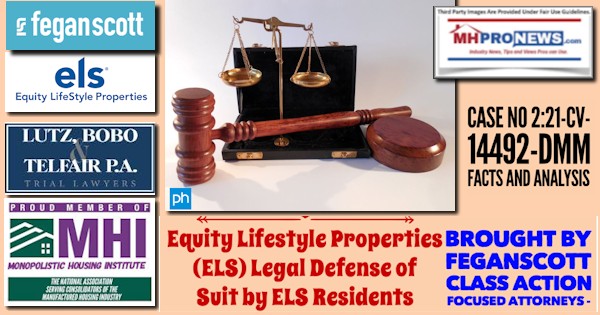
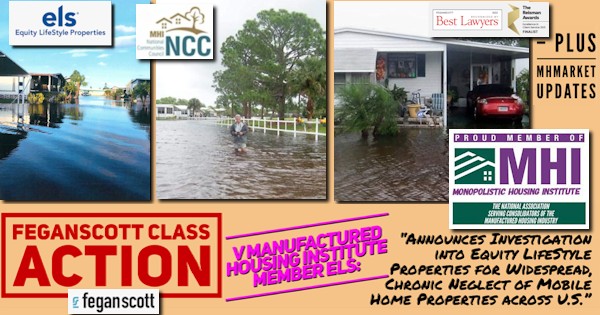
Sadly, in our society while the many may swing an election, the money routinely has the insider connections. That is why the many must do more organizing, get and/or stay informed, educating others, and staying engaged matters.
If at the state level, for instance, enough community residents are organized, a small committee, perhaps with a pro-bono or other attorney involved, could go to public officials to insist on these issues and possible solutions.
Note that some massive scandals have occurred in the 21st century in the U.S.A. Some of those scandals operated quite openly for years. Several of those scandals came to a somewhat just end once the combination of public outcry, improved media coverage of the issue, and public officials recognized that the tide has shifted away from a previously ‘protected’ person or organization occurred. See the report linked below to grasp that pattern.

VIII. There is Good News, Which Must be Shared for Balance
All too often the good news about manufactured homes and manufactured home community living is ignored or only briefly mentioned by some like MHAction. That’s a problem, for who? For resident manufactured homeowners. We’ve promoted the good news about manufactured housing and manufactured home community living since we’ve launched MHLivingNews. That supports manufactured home resident values – i.e.: equity for the homeowners. It is a necessary vantagepoint.
In recent years, due to the increase in predatory behavior by often MHI member connected brands, MHLivingNews has published a mix of the good news along with the bad and ugly that is occurring.
We’ve also published reports that coach prospective homeowners on how to avoid becoming the victim of predatory brands.
The Bottom Line?
This article aims to introduce the reader to these facts, evidence, and possible solutions based on expert opinions. It is not exhaustive. It should not be construed as specific legal advice. Rather, these general ideas could prove useful when properly pursued and implemented.
That said, as a natural follow up to this report are the ones from James A “Jim” Schmitz Jr. and his fellow Minneapolis Federal Reserve researchers. Said Schmitz and/or his colleagues, to win the battle for affordable housing requires fighting ‘sabotaging monopolies.’ Schmitz and his colleagues have addressed problems in several sectors of the economy, but have specifically discussed the problems found in manufactured housing.
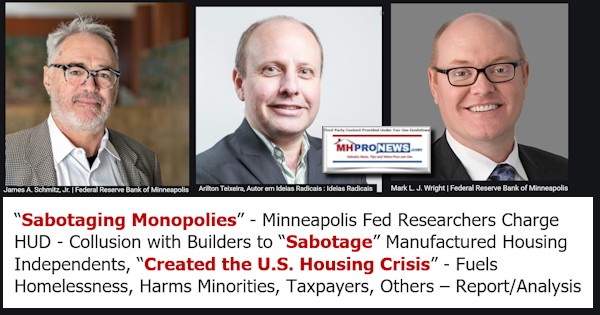
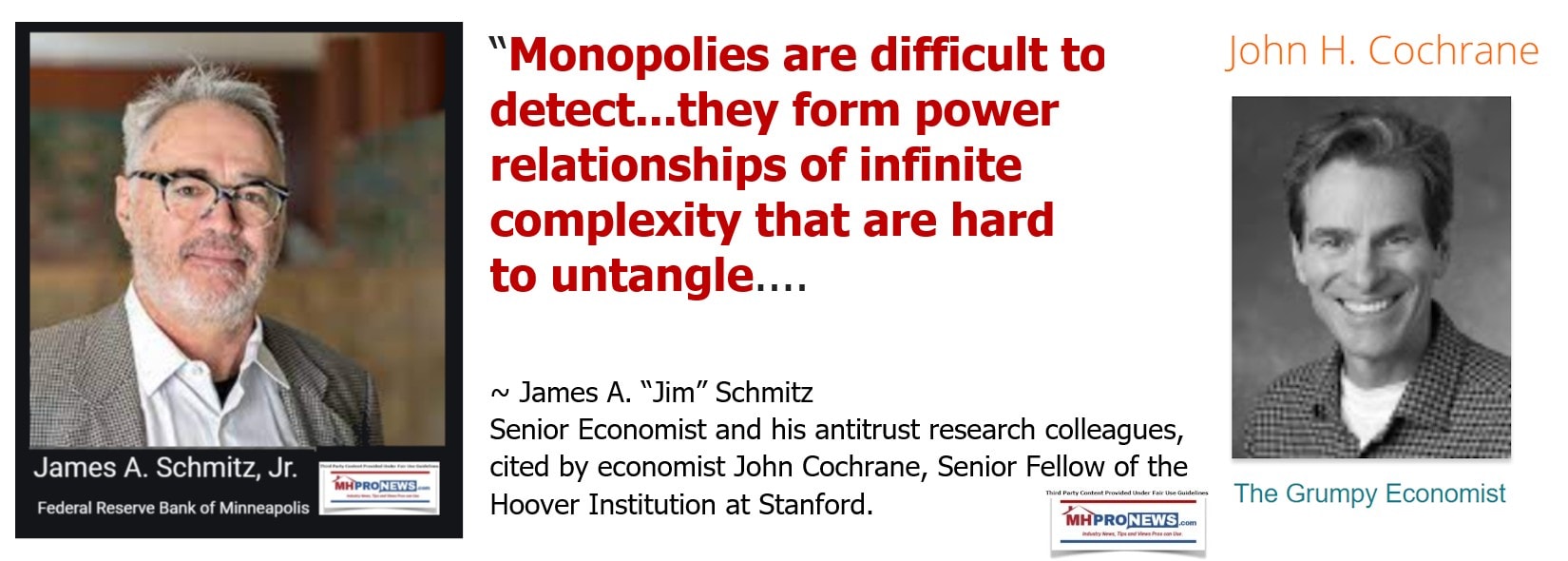
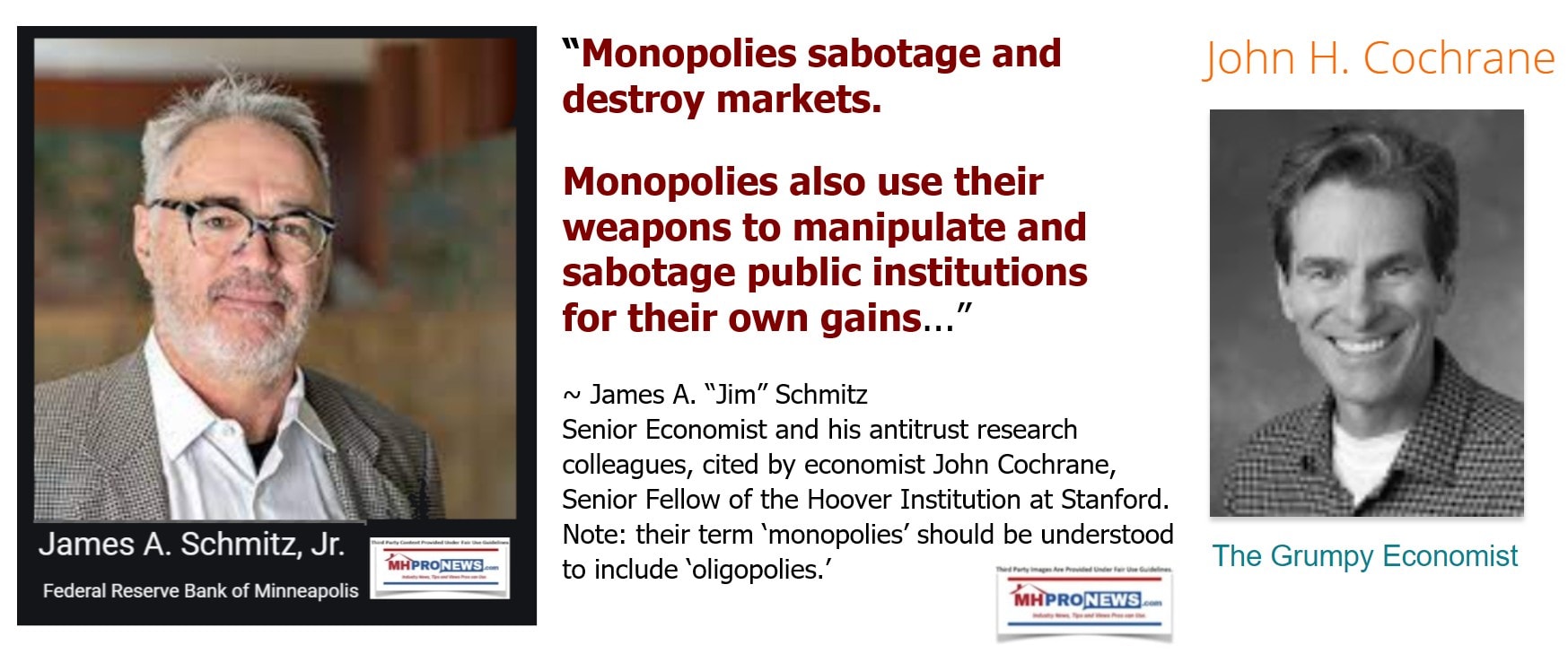
As or perhaps more important is the research by Samuel “Sam” Strommen with Knudson Law. Strommen’s legal thesis is described in his title.


Strommen took the time to document the evidence and legal rationale necessary to open a case at the state and/or federal level.
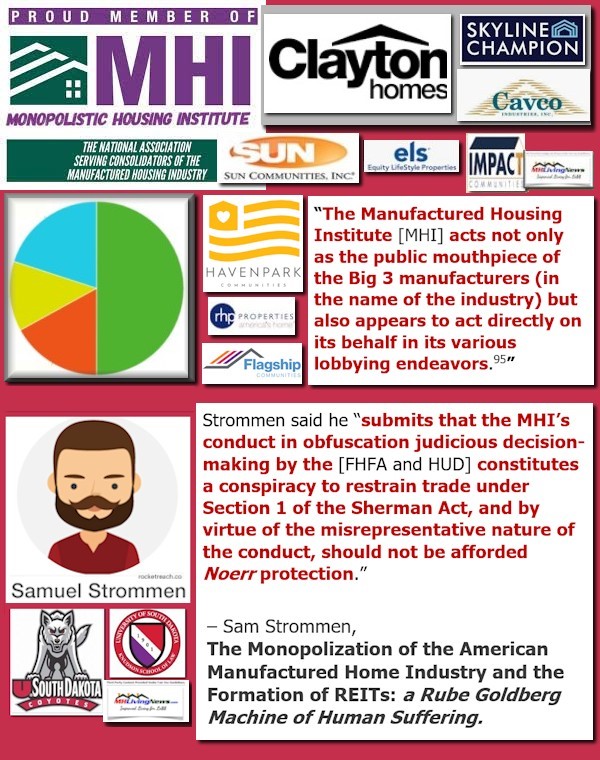
But let’s go one step beyond Strommen’s fascinating and useful research. There are dozens – one source says about 400 – local prosecuting attorneys under various titles. Instead of merely complaining to lawmakers, which is important, resident groups should seek out these prosecuting attorneys with evidence like that found and linked from this report. A prosecuting attorney has the authority to empanel a grand jury. Once empaneled, a grand jury can be used to subpoena records and bring criminal charges.
Books could be written on these topics. The fact that so many research papers cover some, but not all of these issues is steadily being corrected by MHLivingNews and/or MHProNews. Strommen is among those who have made that point, publicly praising our publications for bringing forward the evidence and related facts he often used to ‘make his case.’
As with Van Cleef, someone who digs into these issues will find factual and evidence-based reports on our platforms which especially in recent years, have focused significant coverage on the problematic behavior that is harming white hat independents as well as residents alike.
As a side note, while the Manufactured Housing Association for Regulatory Reform (MHARR) is an independent producers-focused trade group, there are times when MHARR and local-state or national resident groups may find a natural ally. Their reports on their website are public. They have routinely been written and/or vetted by an attorney. So, once more, while not legal advice per se, they provide a resource that is routinely sound, objective, and useful.
In conclusion, MHLivingNews and our MHProNews website will continue to spotlight problematic and “predatory” behavior. But in the ideal, residents should dig deeply into these concepts. This should be thought of as a starting point, not a finale. For those who decide to explore or embrace these notions, touch base and let us know. We may become mutual resources. Because the many can defeat the money, but it will take a winning strategy based on sound plans that relied on evidence, the law, and a sense of true justice. Stay tuned for more in the days ahead. ##
###


That’s a wrap on this installment of “News through the lens of manufactured homes and factory-built housing” © where “We Provide, You Decide.” © ## (Affordable housing, manufactured homes, reports, fact-checks, analysis, and commentary. Third-party images or content are provided under fair use guidelines for media.) (See Related Reports, further below. Text/image boxes often are hot-linked to other reports that can be access by clicking on them.)

By L.A. “Tony” Kovach – for MHLivingNews.com.
Tony earned a journalism scholarship and earned numerous awards in history and in manufactured housing. For example, he earned the prestigious Lottinville Award in history from the University of Oklahoma, where he studied history and business management. He’s a managing member and co-founder of LifeStyle Factory Homes, LLC, the parent company to MHProNews, and MHLivingNews.com. This article reflects the LLC’s and/or the writer’s position, and may or may not reflect the views of sponsors or supporters.
Connect on LinkedIn: http://www.linkedin.com/in/latonykovach
Recent and Related Reports:
The text/image boxes below are linked to other reports, which can be accessed by clicking on them.
 manufacturedhomelivingnews.com Manufactured Home Living News
manufacturedhomelivingnews.com Manufactured Home Living News


